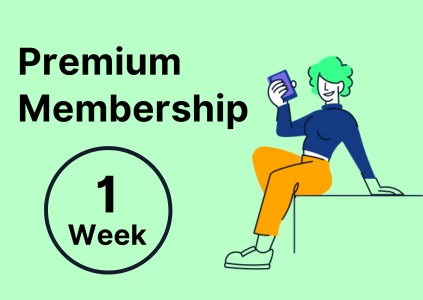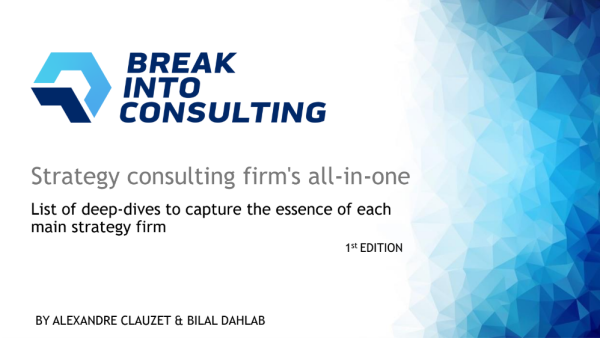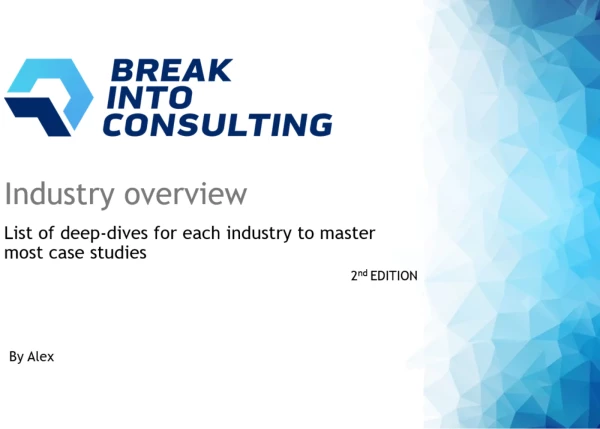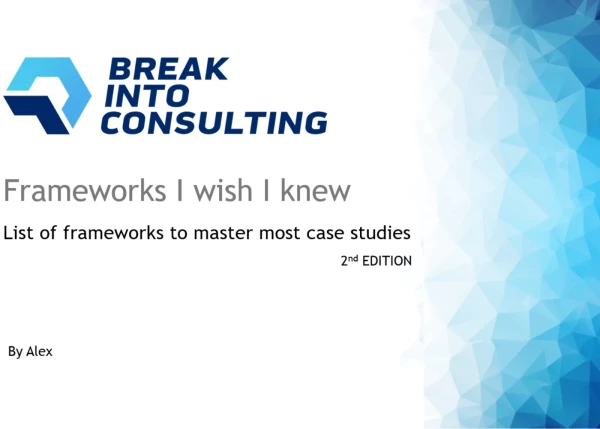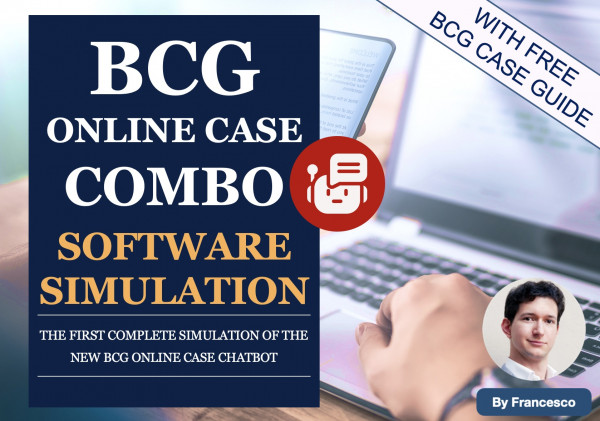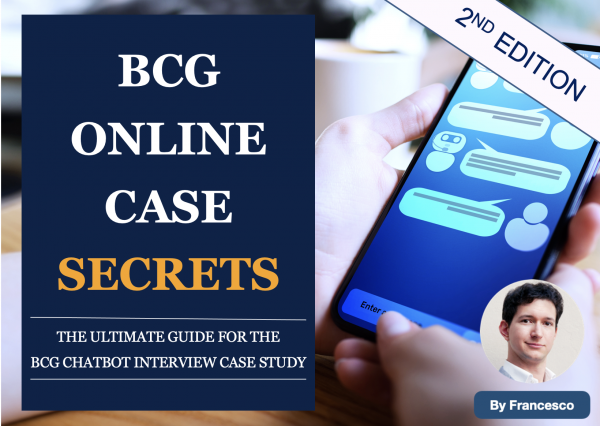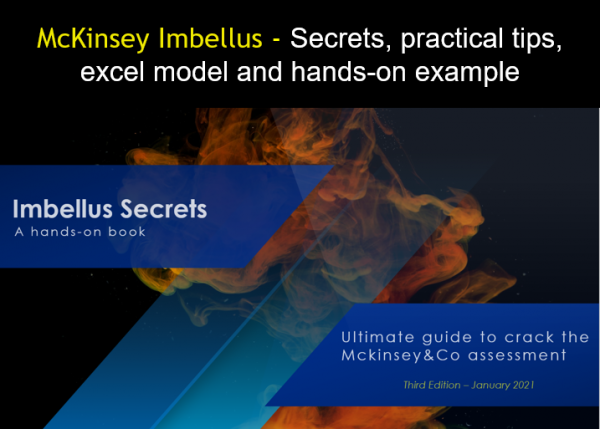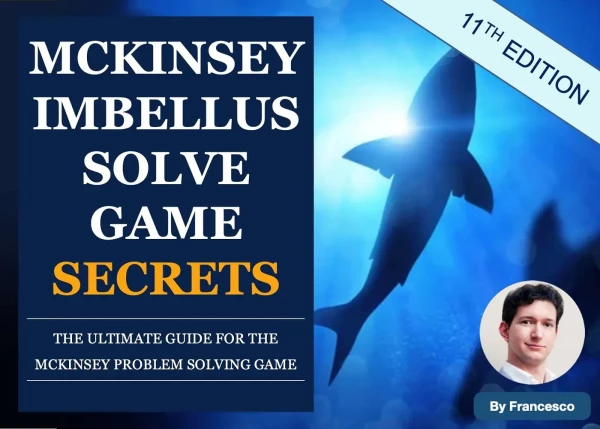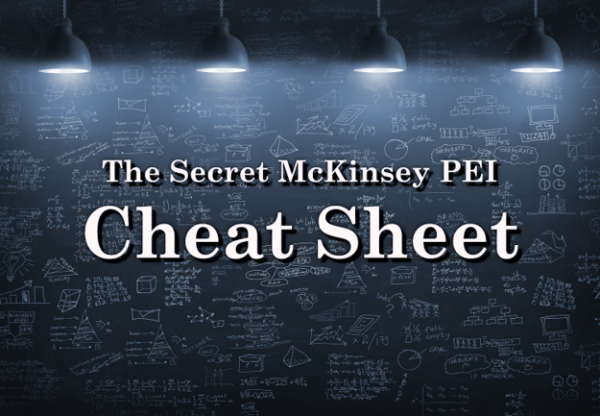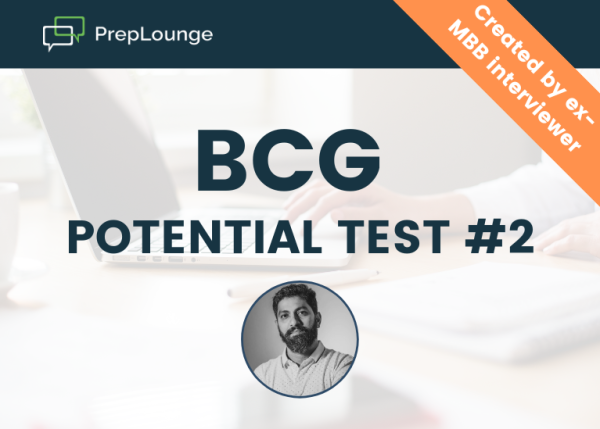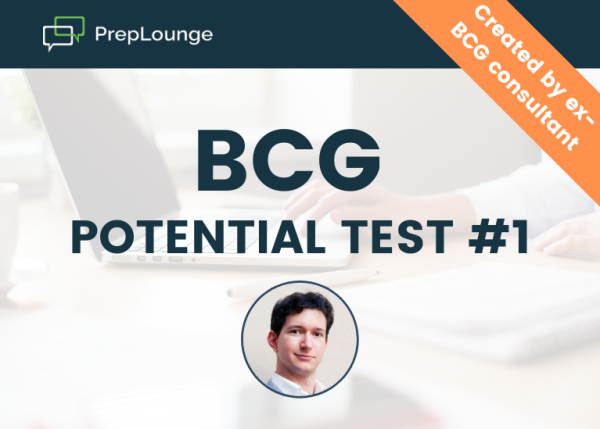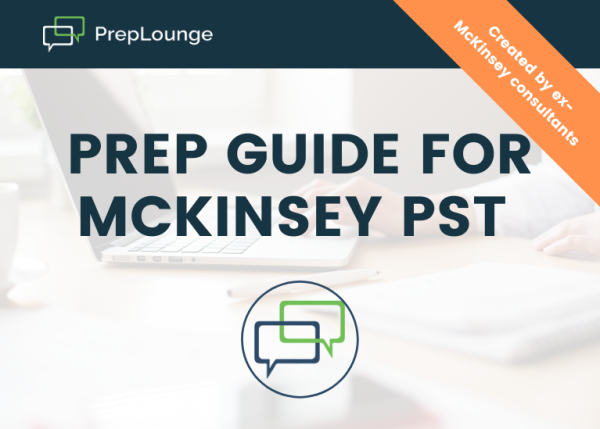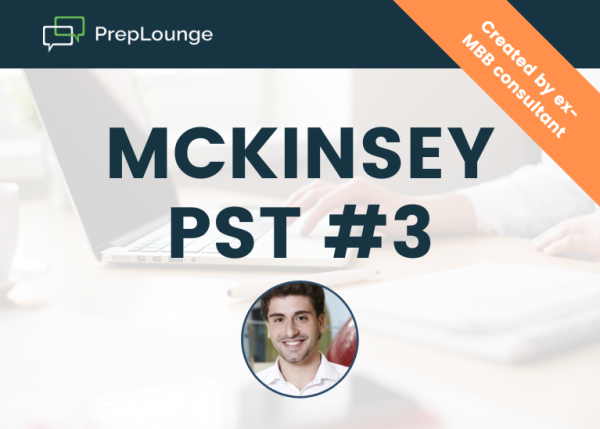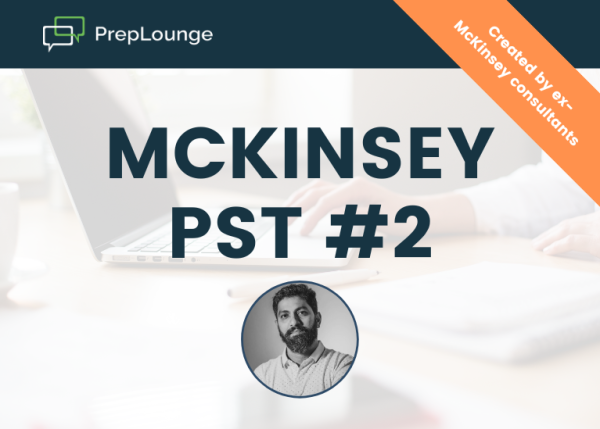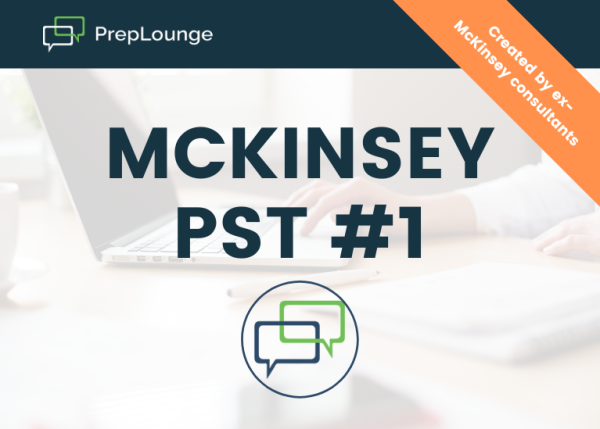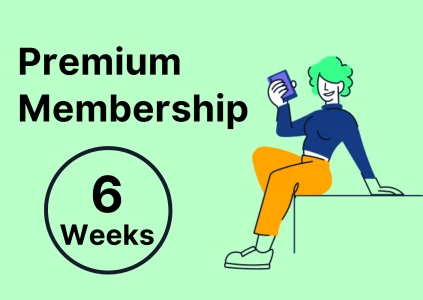Does anyone know how to prepare for final round? It is much different than the first round preparation? The FIT portion is more important at this round?
(editiert)
Does anyone know how to prepare for final round? It is much different than the first round preparation? The FIT portion is more important at this round?
(editiert)
Hi mate,
I've recently accepted an offer for McKinsey Sydney so I can give you a more recent assessment of the differences.
I'll breakdown my assessment into the Case interview and the PEI section.
The case interview differred in pace and content. Pace wise they moved quicker, didn't waste time on you rambling and will interrupt you more often. Be prepared of this, the key quote was "if it felt like I was moving quickly, it's because I felt you were doing well, so don't feel flustered as I interrupt and keep moving through the questions." The conversations are fast paced and you should feel ready to quickly outline your hypothesis and start spitballing with your Partner.
Content wise as you would know there is a large packet of case information available to the interviewers. My two Partner interviews barely touched the case information, in fact the Senior Partner just started talking in a very conversational manner, his exact words to begin the case. "Oh that's interesting, hey since you're interested in the services sector I've got this interesting problem that I hope you can help me with..." It was very fluid, the whole case lasted 15 minutes because it wasn't a structured Q1 Q2 structure.
I think the 2 key take aways from my interview experiences are that while real case practices are the gold standard, having the mental ‘muscle memory’ from talking out loud and being able to critically assess problems was also critical in my success. Furthermore being able to treat the interview as a friendly conversation helps in being more comfortable with the pacing.
Finally, the Personal Experience Interview were different in two ways, weighting and content. Firstly the PEI had more weighting than I expected during my interview rounds, especially the partner interviews. My preparation during first round for PEI was fairly light, writing down a few ‘head line stories’ on a notebook and hoping to be able to discuss the details as the interviewer asked. In reality the PEI section was literally 50% of your 60 minutes, going up to 60-70% in your partner interviews.
The feedback from my round 1 interviewers was that I should brush up on my stories to be more structured and detailed.
Secondly in the partner interviews they structured the questions differently, my final Senior Partner interview went like this:
"Talk about your leadership capabilities, but I want you to imagine you are on the front page of the newspaper, I want to see your 5 word Headline, and three dot points that are 10 words or less that described what you did."
They would ask questions such as “why did you choose to talk to X in this location?”, “what reactions were you looking for when you said that?” Unless you had really thought about your stories, these details would be hard to remember on the spot.
The key take away for the PEI section is that it is definitely a 1:1+ ratio for Case interviews to PEI, and your preparation should reflect this.
Good luck with your prep.
Cheers,
Lucas
Dear future consultant,
Congratulations and all the best luck for the final round. In my experience, a firm like Mckinsey does not forgive mistakes to any applicant, so you did a good job during the first round.
- For the fit part: interviewers will go deep in other examples for leadership, analytics, conflict, teamwork, etc. So have at least three (3) different answers for each potential fit question. Do not use the same examples that you provided during the first round
- For the case part: expect the same drill
WHAT IS IMPORTANT is that the structure and dynamics of the interview might change. So, I would recommend you to read the "Consulting Q&A" the questions "First round interview with a senior director" which will give you an idea what would you expect in the final round (have in mind that senior consultants hold the final interviews (e.g., Partners) in most cases.
In case you don't find it, I have copied my answer below:
""""""""""""""""""I hope this short message finds you well and helps you in your preparation. The more senior level the interviewers are, the more creative they become during the interviews. What does it mean? That they can take the conversation wherever they want and with no specific order (they can jump from a fit question to a numerical question, then return to the fit part and finish with a small case)
However, the mechanics and gist of the interview won't change. They have to answer the following critical questions:
1) Are you a good fit for the company? This is basically the fit part of the interview in which you probably can expect a) stress interview b) going very deep into specific examples c) multiple skills assessment from previous experience
2) Do you have the skills set to become a good consultant? This is basically the case part in which the interviewer can ask you a) out of the hood numerical questions b) short interview cases c) real cases that the interviewer is currently working d) cases that the interviewer is inventing while he is speaking to you.
One final recommendation is not to feel nervous if you feel that the interview is not "structured", this is how senior level professional approach their interviews.""""""""""""""""""
Regards,
Hugo
(editiert)
I want to share my experience as an ex-Mckinsey consultant and part of recruiting team, here is my perspective:
How do these interviews with the partners differ from the first round interviews?
Every partner discussion is different and the direction the conversation takes depends on role that you are interviewing for, feedback that the partner has got from earlier rounds and of course the Partner’s personality.
However, generally it is advisable to keep the following things in mind.
1) Are the cases delivered with the same style of precision and structure as the first round?
- A lot of times, the Partner round case discussions are less structured. Partners tend to give real life case from their experience or sometimes they can also pick a situation from the candidate’s CV, make a few changes and turn it into a case.
2) Is the Fit format consistent with the PEI, or do the partners take these conversations in different directions?
- Generally, Partners will hit fewer topics but will go much deeper. So they will ask you about something and then you should expect a lot of follow on questions. They really want to understand the full story
3) Generally, what portion of the hour-long session is dedicated to the case study?
- approx. 30-40 minutes
3) What personality traits are most important to demonstrate with the partners?
See the answer below.
Keep the following things in mind while preparing for the Partner interview:
Better synthesis – Your analytical mindset has already been tested in earlier rounds. Partners would like to test your client readiness. Partners pay more attention to how you draw your conclusions, communicate your conclusions, how you synthesis etc.
Comfort with less structured case discussion – Partners love to test your creativity, out of the box thinking. Multiple times in the discussion they can ask you your opinion on the data point/clarification that you had asked, to check your business acumen e.g. you asked, what is the growth rate of our client; partner responds what number would you want to assume? or open ended questions e.g. tell me more, is there anything else?
Consistent stories and deep dives – Partners would want to know your story. They want to see whether your decision to join McKinsey is consistent with your career story. Whether the achievements you have mentioned on the CV are consistent with your project stories. Partners will drill down into your experiences and achievements to the extreme. They want to understand how you react to challenges and how you think and communicate about your past work.
Feel free to get in touch with me in case of further clarification/advise on this topic.
All the best!
Hi,
It depends on the company:
Mckinsey is a bit more structured and demanding in its approach with the fit part that takes up to 30 minutes. They will ask all sets of questions including a story on 1 of 3 competencies: Leadership, Achievement, Personal Impact. The partners on the last round are more experienced and they will challenge every single detail of your story. So make sure that you have a couple of backup stories.
BCG interviews are a bit shorter, a bit less structured and detailed. They will also test competencies like leadership, Impact, Teamwork. Similar to McKinsey, the partners on the last round are more experienced and they will challenge every single detail of your story.
On the contrary, Bain consultants will be less concerned about your stories and will not have strict guidelines. They will mostly check your background and motivation.
For all the companies "your questions to the interviewer" is an important part. Basically, it is a chance to ask questions at the end of the interview after the case. The last impression is always important. It's a free chance to demonstrate your smartness and curiosity to the partner of the company. It is also an opportunity to express your interests and mention extra-curricular activities beyond the fit interview topics.
Good luck!
Hi,
Fit interview questions are the same at McKinsey interviews on both rounds (Why mck, why consulting, a story about you, 3 stories on competencies, your questions to the interviewer).
The main difference is that you'll have interviews with partners and directors who are more experienced interviewers. Your interviewer will check how real your story is and having lots of experience it will be relatively easy for him to challenge any of your actions. You should be ready to provide even more granular actions, key milestones and a breakdown of potential effects.
Here are some potential implications:
Good luck!
Hi,
In the final round, I would expect a bit more structured and demanding approach to the fit part. The partners in the last round are more experienced and they will challenge every single detail of your story. So make sure that you have a couple of backup stories. Thus:
1) Make sure that you've prepared everything: A story about yourself, motivational questions and the main FIT stories. Also, don't forget about your questions to the interviewer - you'd rather have an interesting conversation and score some point instead of a simple Q&A session
2) Then go through each story and think of the additional questions the interviewer may ask. It’s important since additional questions will take up to 50% of the interview. Try to remember the main details and facts and make sure that you know how to explain the key concepts quickly. Test your stories with your friends, ideally consultants, and ask for their feedback. There can be multiple groups of additional questions:
3) Now work on 3-6 backup stories. During your interviews, you can then use these stories or adapt these stories to the additional questions your interviewer asks you.
You may be interested, why you need to prepare several stories for each question? At the end of the day, it's not that easy to come up with all of these stories. I've answered here: Repeating Fit Interview Stories
As for the cases - Partners and Directors have their own favorite cases and may even want you to lead the case. The key difference:
It may seem to you that these 2 types of cases are different, however, the interviewer-led type is just a simplified version of the interviewee-led case. My advice is to always prepare in the interviewee-led format so that you could solve both easily.
Best
Hi,
It has no difference with the final round McKinsey interviews in any other country.
In the final round, I would expect a bit more structured and demanding approach to the fit part. The partners in the last round are more experienced and they will challenge every single detail of your story. So make sure that you have a couple of backup stories. Thus:
1) Make sure that you've prepared everything: A story about yourself, motivational questions and the main FIT stories. Also, don't forget about your questions to the interviewer - you'd rather have an interesting conversation and score some point instead of a simple Q&A session
2) Then go through each story and think of the additional questions the interviewer may ask. It’s important since additional questions will take up to 50% of the interview. Try to remember the main details and facts and make sure that you know how to explain the key concepts quickly. Test your stories with your friends, ideally consultants, and ask for their feedback. There can be multiple groups of additional questions:
3) Now work on 3-6 backup stories. During your interviews, you can then use these stories or adapt these stories to the additional questions your interviewer asks you.
You may be interested, why you need to prepare several stories for each question? At the end of the day, it's not that easy to come up with all of these stories. I've answered here: Repeating Fit Interview Stories
As for the cases - Partners and Directors have their own favorite cases and may even want you to lead the case. The key difference:
It may seem to you that these 2 types of cases are different, however, the interviewer-led type is just a simplified version of the interviewee-led case. My advice is to always prepare in the interviewee-led format so that you could solve both easily.
Best
Hi,
Can't agree with Francesco here. At McKinsey, the final rounds are pretty often interviewer led as well (1st rounds are interviewee-led). Mostly because the partners don't really care about the guidelines.
The FIT part is more structured at McKinsey. I would say that if at BCG Fit part is 30% of the success, at Mckinsey it is 50%.
Best!
(editiert)
There is not much difference. At least in theory. In practice, the more senior interviewers in the later rounds are a bit more lax, but you should approach the interviews in exactly the same way.
Hi Anonymous,
Specifically, the main difference you will find in a final round with partners is that at that stage they:
spend more time on fit questions and your alignment with the company
check more closely your communication (eg how you react to challenging questions)
may not have a “proper” structured case to present – during one of my MBB finals, I had one interview which was made by two market sizing questions and a brainteaser, without any business case. That's because during the final they know you can structure and crack a case (you passed 1 or 2 rounds already) and are more interested in your logic, personality, and fit with the company.
Best,
André
(editiert)
Hello!
On top of the insights already shared in the post, the "Integrated FIT guide for MBB" has been recently published in PrepLounge´s shop (https://www.preplounge.com/en/shop/tests-2/integrated-fit-guide-for-mbb-34)
It provides an end-to-end preparation for all three MBB interviews, tackling each firms particularities and combining key concepts review and a hands-on methodology. Following the book, the candidate will prepare his/her stories by practicing with over 50 real questions and leveraging special frameworks and worksheets that guide step-by-step, developed by the author and her experience as a Master in Management professor and coach. Finally, as further guidance, the guide encompasses over 20 examples from real candidates.
Feel free to PM me for disccount codes, since we still have some left from the launch!
Hope you find it useful!
Best,
Clara
Die McKinsey Growth Pyramid ist ein strukturiertes Framework für nachhaltige Unternehmensentwicklung. Finde heraus, wie du sie im Case-Interview nutzen kannst.
Entdecke die Geheimnisse von Zielsetzung, Realitätsprüfung, Optionserkundung und Zukunftsplanung – eine Neudefinition deines Erfolgswegs.
Erfahre alles über BCG Online Case und wie du dich damit auf dein Job-Interview bei der Boston Consulting Group oder einem anderen Unternehmen bewerben kannst!
Erfahre, was genau das 7S-Framework von McKinsey ist und wie es Unternehmen dabei unterstützt, Stärken zu maximieren und Schwachstellen zu identifizieren.
Lerne, worauf es bei einem Case-Interview im Consulting ankommt und erfahre alles über die Case-Interview-Basics bei PrepLounge!

